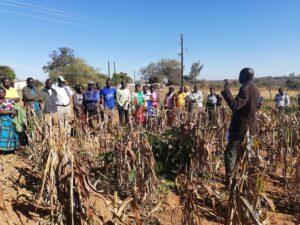What is Organic Farming If Not Sustainable?
What is organic farming? More and more people are looking to avoid pesticides, genetically-modified crops and single-crop growing practices (mono-cropping) from their food. Since 2018, U.S. organic foods and goods sales have broken the $50-billion mark. But that doesn’t always mean organic farming is sustainable, for either the environment or the farmers growing the crops. The same powerful big-ag corporations still own many of the most popular organic brands on the market.
That’s where the work of our partners, and allies like the African Centre for Biodiversity (ACB), comes in. They’re pushing for sustainable organic agriculture, also known as agroecology. In places like Zambia in southern Africa, farmers are building a movement to challenge not only pesticides and mono-cropping, but the corporate capture of farming as a whole. In place of these, they are combining modern science with traditional knowledge.
Between May and July, ACB joined other small-holder-farmer organizations to host four trainings and exchanges. Groups like the Kanchomba Farming Institute (KFI), Zambia Alliance for Agroecology and Biodiversity (ZAAB), and East and Southern Africa Farmers’ Forum (ESAFF) Zambia brought out over 100 people. Below are excerpts from a series of ACB reports and briefing papers.
Sharing Agroecology
As one report states: « In Zambia, food and farming systems have changed rapidly, and for the worse. Increasingly, farmers use chemicals and poisonous inputs, which they need to purchase. The nation’s agriculture budget subsidizes fertilizer and seed through the Farm Input Support Programme (FISP). » The FISP enriches big companies while the soil wears away and a few cash crops chip away at biodiversity.

It continues: « Participants visited the host farmer Mercy Shibeleki’s kitchen garden and the farm of Noel Chalimbwa, a seed custodian working with CTDT [Community Technology Development Trust]. » This sparked a discussion on the merits of various agroecology techniques. That includes producing and using manure, compost and organic liquid fertilizer, and dealing with pests.
Another piece reports on the challenges facing southern Zambia. Severe droughts in recent years have made the already hot, dry climate near Pemba even worse. « The current farmer input support programme (FISP), with its strong bias to chemical fertilizers and hybrid maize seeds, has not resulted in sustainable farming practices nor has it enhanced climate resilience. »
What is organic farming without GM-free seeds? « And yet, while 75% of seed is still accessed through the farmer seed system, the knowledge of how to maintain indigenous seed varieties, which is linked to the preparation of local foods, is under threat. »
Testimonials from farmers
Here’s what farmers have to say about organic farming.
Brian Chavwanga, Kanchomba Farm Manager:
Sustainable organic agriculture is environmentally friendly. We do not introduce harmful chemicals into the soil or pollute the water. It is acceptable to our local culture. Just as we won’t introduce harmful chemicals into the soil, in the same way we won’t introduce things into our communities that are harmful. Sustainable agriculture involves a lot of effort and planning, but as time goes on, it is more fruitful and more profitable. There is a lot of indigenous technological knowledge we have. In agroecology we tap that knowledge and put our ideas together with science.
Theresa Mataka, farmer, Kalulushi:
I am trying to do organic farming. When you go to the farm you can see different types of things – broilers and local chickens, production of medicines for vaccines and treatment. I am doing minimum tillage. I use wild plants to treat pests in the small garden. There is still a challenge of soil pests – nematodes. I use manure and liquid manure for foliar fertiliser. Some methods are in the process, some are already matured. I started cultivating the land using conservation, not burning after harvesting but rather burying residues in the soil, also diversification, increasing the number of crop types, and using ashes to remove insects.
Mary Sakala, farmer, Rural Women’s Assembly, Mumbwa:
Climate change has come to stay and it is real. Usually they talk of the southern part [of Zambia] being affected but even Central Province where I come from was badly affected this year. I am a beneficiary of FISP, and so are other farmers, who are producing mostly monocultures. But some did not get even one cob from the field. When you add urea, you are adding to the dryness of the field. It is being used as a booster. You are boosting the crop, not the soil.
Further Reading
To find out more, please read the two reports (one) (two). Here are the full articles on ACB’s website: Kalulushi District, Copperbelt Province; Shibuyunji District, Central Province; and Pemba District, Southern Province, Zambia.

